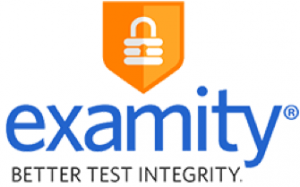Online Proctoring
Online proctoring (eProctoring) offers students the possibility of writing exams off-campus, while assuring academic integrity is maintained. In order to accomplish this, students may write an assessment in an online environment, supervised by a remote proctor who will ensure that the test proceeds according to the instructor’s specified protocols.
The University of Toronto has agreements with two service providers who have been fully vetted for information security and data management practices:
 |
 |
|---|---|
| https://examity.com/ | https://www.proctoru.com/ |
These third-party platforms offer a range of service combinations to ensure academic integrity is maintained. Example strategies include:
- Students show photo identification to webcam to verify identity
- Live proctor observes student taking the test via webcam
- Screen-sharing technology allows proctor to view student computer screen
- Browser lock-down software can be used to restrict access to other computer applications
- Recording of student taking exam
- Review of recording by human proctor after exam
- Automated video review and flagging processes to increase accuracy and efficiency
Service Models
Live proctoring:
• Live proctor onboards students
• Live monitoring of test taker via webcam and mic during exam and report provided
• Recorded for instructor review as needed
Live launch and review:
• Live proctor onboards students
• Automated recording during test
• Review of recording by human proctor after completion and report provided
Automated launch and review
• Automated self-onboarding by students through Quercus
• Automated recording during test
• Review of recording by human proctor after completion and report provided
View a condensed workflow for online proctoring service.
For full details on divisional implementation see the Ed Tech Catalogue located within the Quercus Support Resources.
Oversight
Decisions regarding appropriate use of third-party online proctoring services are the responsibility of divisional academic leadership. Divisional approval is required by the Dean or Dean’s designate prior to use. In some cases an entire program may use the service, while in other contexts students in a specific course may complete exams remotely. Another scenario would be accommodation of individual students who are unable to attend their exam on campus. Online proctoring services may be used for online, hybrid or face-to-face courses as needs dictate.
Academic administrators responsible for oversight of the use eProctoring should consult the Provostial Guidelines for Online Assessment Invigilation
Academic Integrity
Each potential use of third-party online proctoring services will have contextual differences and the specific application of use of these technologies should follow the principles and practices outlined in existing policy documents such as Code of Behaviours on Academic Matters; University Assessment and Grading Practices Policy; and Appropriate use of Information and Communication Technology.
Service Agreements
The service agreements that have been negotiated with two vendors require the academic program area invigilating the exam to cover the cost, or, in unique circumstances, for the fees for examination to be borne by and individual student through direct online payment to the vendor. A range of levels of service available, including live proctoring and also recording with review and/or automated analysis. Costs vary depending on the level of service needed to appropriately ensure academic integrity. A high stakes exam may require fully live invigilation while for a mid-term test the record and review method may be deemed to be sufficient.
Roles and Responsibilities
- Instructors or program administrators responsible for the course must oversee the process and act as liaison with the online proctoring service provider regarding the details for the particular exam. Timing, scripting of invigilator instructions, allowable supports, contact information, etc must be confirmed in advance. Follow up and decisions on action related to any issues flagged by the proctoring process are also their responsibility.
- Students must have a reliable internet connection and computer with sufficient capacity to support live video invigilation and/or recording processes. Generally mobile devices and tablets are not sufficient. The exam may be scheduled in a specific window, or students may be permitted to choose a timeslot within a specified period. The student is responsible for ensuring their account and computer are fully functional prior to the exam.
- Educational Technology Professionals may provide support within program areas as capacity allows. Set up of online tests and exams requires use of the University of Toronto LME, Quercus, as a testing environment. It is helpful to have a divisional technology specialist available during invigilation of larger groups of students simultaneously to act as a liaison.
Student Support
Students may be anxious regarding the technical aspects of writing a test or exam online with a remote proctor or recording. In order to ensure students are comfortable and able to succeed in the assessment process the following strategies are suggested:
- Publish all requirements/details in course syllabus including a link to privacy and security information:
- Use standard text for course syllabus and FAQs. Standard text is available from online.learning@utoronto.ca
- Ensure early communication regarding use of the platform, verification and system testing prior to the actual exam
- Ensure accessibility of exam materials for students with disabilities
Digital Learning Initiatives Portfolio will provide consultation and support for eProctoring implementation. Contact the Director of Digital Learning Initiatives or online.learning@utoronto.ca for more information.